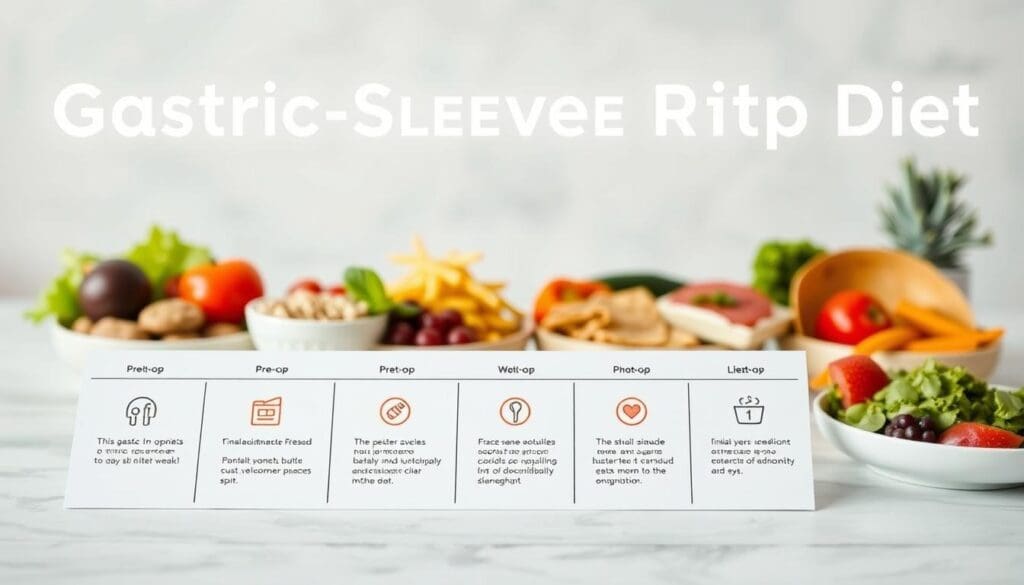
Starting a weight loss journey with gastric sleeve surgery needs careful planning. You must follow a specific dietary regimen before and after surgery. A good pre-op diet helps shrink the liver, making surgery easier.Get 12 essential tips for your gastric sleeve post op diet. This guide includes a pre-op diet plan for your best chance at success.
After surgery, sticking to a gastric sleeve post op diet is key for a good recovery. It helps you lose weight and succeed in the long run. At Liv Hospital, experts focus on you, giving personalized diet advice.
Knowing the basics of pre-op and post-op diets is important. Eating nutrient-rich foods and following a meal plan can improve your recovery and weight loss. This approach helps you succeed in your weight loss journey.
Key Takeaways
- Follow a pre-op diet to reduce liver size and facilitate surgery.
- Adhere to a post-op diet for optimal recovery and weight loss.
- Focus on nutrient-rich foods for enhanced outcomes.
- A structured meal plan is key for long-term success.
- Patient-centered care is essential for personalized guidance.
Why Your Post-Surgery Diet Matters

After gastric sleeve surgery, it’s key to follow a specific diet. This diet helps avoid complications and aids in weight loss. It’s vital for your recovery and long-term health.
Reducing Surgical Complications
A good post-operative diet can lower risks like nausea, vomiting, and constipation. It also helps avoid gastric leaks. By slowly moving from clear liquids to solid foods, patients can greatly reduce these risks.
- Clear Liquids Phase: Helps in healing and reduces the risk of complications.
- Gradual Progression: Allows the stomach to adjust to the new diet, reducing the risk of adverse effects.
Setting the Foundation for Long-Term Success
A post-surgery diet does more than aid in recovery. It also lays the groundwork for long-term weight loss success. By starting with healthy eating habits, patients can keep weight off for good.
- Healthy Eating Habits: Developing a routine that includes nutrient-rich foods.
- Portion Control: Learning to manage food portions to avoid overeating.
By focusing on these key points, patients can have a successful weight loss journey. This improves their overall health.
The Complete Gastric Sleeve Post Op Diet Timeline

Knowing the gastric sleeve post-op diet timeline is key for a smooth recovery. The diet moves from clear liquids to solid foods gradually.
Phase 1: Clear Liquids (Days 1-7)
The first phase uses clear liquids to help the stomach heal. You can drink:
- Water
- Clear broths
- Electrolyte-rich drinks like sports drinks
- Sugar-free gelatin
It’s important to drink a lot and avoid straws to prevent air in the stomach.
Phase 2: Full Liquids (Days 8-14)
In this phase, you can start drinking more calorie-rich liquids and thin purees. Try:
- Thinned soups
- Protein shakes
- Low-fat milk
- Sugar-free pudding
This step focuses on getting more protein to help with healing and keep muscles strong.
Phase 3: Pureed Foods (Days 15-30)
Pureed foods are a big step towards solid foods. They’re blended to make digestion easier. Good choices include:
- Pureed veggies and fruits
- Soft, cooked, and pureed meats
- Low-fat dairy
- Protein-rich foods
Eat slowly and stop when you’re full to avoid eating too much.
Phase 4: Soft Foods to Regular Diet (Days 31+)
The last phase introduces soft foods and then regular foods. The diet should be high in protein and low in fats and sugars. Soft foods include:
- Soft-cooked veggies
- Tender meats
- Ripe fruits
- Whole grains
Chew your food well and eat slowly to get used to your new stomach size.
By sticking to this diet plan, gastric sleeve patients can avoid complications and have a successful recovery.
Tip 1: Master the Art of Hydration Without Diluting Digestive Enzymes
Drinking enough water is key after gastric sleeve surgery. It helps with hunger, healing, and keeps the body working right. A famous bariatric surgeon says, “Hydration is key to a successful recovery.”
Recommended Daily Fluid Intake
Doctors tell patients to drink at least 92 ounces of fluids each day. This includes water, clear broths, and drinks with lots of electrolytes. Make sure to drink at least 64 ounces of water and the rest from other fluids. Drinking fluids all day helps avoid stomach upset.
Timing Your Water Consumption
When to drink water is important after gastric sleeve surgery. Drink water between meals to keep digestive enzymes strong. Waiting 30 minutes after eating helps your body absorb nutrients better.
“Drinking water between meals is key to avoid diluting digestive enzymes and support nutrient absorption.”
Signs of Dehydration to Watch For
Dehydration is a big risk after gastric sleeve surgery. Look out for dark urine, dizziness, feeling tired, and dry mouth. If you see these signs, drink more fluids right away and talk to your doctor if they don’t go away.
Learning to stay hydrated is vital for health and recovery after gastric sleeve surgery. Remember, drinking enough water is a big part of a good post-op diet.
Tip 2: Prioritize Protein at Every Stage
After gastric sleeve surgery, eating enough protein is key for a good recovery. Protein helps keep muscles strong, aids in healing, and boosts overall health.
Daily Protein Requirements After Surgery
Doctors tell patients to eat a lot of protein every day. Aim for 60-80 grams of protein daily to avoid losing muscle and keep the body working well.
Recommended Daily Protein Intake:
| Post-Op Days | Protein Intake (grams) |
| 1-7 | 60 |
| 8-14 | 60-80 |
| 15+ | 80+ |
Best Protein Sources for Each Recovery Phase
Protein sources change as recovery progresses. At first, patients use liquid or pureed proteins. Later, they move to solid foods.
- Liquid/Pureed Phase: Protein shakes, Greek yogurt, pureed chicken or fish.
- Soft Foods Phase: Scrambled eggs, cottage cheese, tender meats.
- Regular Diet: Lean meats, fish, poultry, beans, lentils.
Protein Supplements: When and How to Use Them
Protein supplements help meet daily needs, mainly in the early stages after surgery.
“Protein supplements can be a lifesaver for patients struggling to meet their protein needs through whole foods alone. It’s important to pick supplements low in sugar and high in protein.”
Whey protein, casein protein, and collagen protein are good options. Always talk to your doctor to find the right supplement for you.
Tip 3: Navigate Food Reintroduction Strategically
Reintroducing foods after gastric sleeve surgery needs patience and careful planning. It’s important to understand how your body reacts. This step is key to avoiding problems and smoothly adjusting to your new diet.
The One-at-a-Time Testing Method
This method involves adding new foods one at a time. It helps you see how your body reacts to each food. This way, you can spot any foods that might cause discomfort or bad reactions.
Steps for the one-at-a-time testing method:
- Choose a new food to introduce.
- Start with a small amount.
- Monitor your body’s response over 24 hours.
- If there are no adverse reactions, gradually increase the amount.
Foods to Approach with Caution
Some foods might be harder for your body to handle after gastric sleeve surgery. It’s important to be careful with these foods and watch how your body reacts.
| Food Category | Examples | Potential Issues |
| Dairy | Milk, cheese, yogurt | Lactose intolerance, discomfort |
| High-fiber foods | Fruits, vegetables, whole grains | Digestive issues, blockages |
| Tough or dry meats | Steak, jerky | Difficulty chewing, discomfort |
When Can I Eat Ice Cream After Gastric Sleeve?
Introducing ice cream after gastric sleeve surgery can be tricky. It’s high in sugar and fat. It’s best to wait until you’re eating soft foods, usually 4-6 weeks after surgery.
When you do try ice cream, start with small amounts. Watch how your body reacts. You might want to try lower-sugar options or alternatives like frozen yogurt.
Tip 4: Prevent Nutritional Deficiencies with Proper Supplementation
Supplementation is key after gastric sleeve surgery. It helps prevent nutritional deficiencies. This is because the surgery changes how the body absorbs nutrients.
Essential Vitamins and Minerals After Sleeve Gastrectomy
Patients often need to take supplements after surgery. These include multivitamins, calcium with vitamin D, and iron. Multivitamins are important for health. Calcium with vitamin D helps bones, and iron prevents anemia.
The vitamins and minerals needed can vary. It depends on the patient and the surgeon’s advice. Common supplements are:
- Multivitamins
- Calcium with Vitamin D
- Iron
- Vitamin B12
- Vitamin D
Creating a Supplement Schedule
Creating a schedule for supplements is helpful. Patients should work with their healthcare provider to make one. This schedule should include the type of supplement, how much, and when to take it.
Some supplements work better with food, while others are better on an empty stomach. Consistency is key to keep nutrient levels right.
Working with Your Doctor to Monitor Levels
It’s important to regularly check nutritional levels. Patients should have blood tests to check for deficiencies. Based on these results, the doctor can adjust the supplements.
Collaboration with healthcare providers is vital. It helps catch and fix nutritional deficiencies quickly. This keeps health in check and supports weight loss goals.
Tip 5: Adopt Mindful Eating Techniques
Mindful eating is more than a technique; it’s a lifestyle change. It can greatly improve your weight loss journey and overall health after gastric sleeve surgery. Being more aware of your eating habits helps you develop a healthier relationship with food and better digestion.
The 20-30 Minute Meal Rule
The 20-30 minute meal rule is a key part of mindful eating. It says it takes about 20-30 minutes for your brain to feel full. Eating slowly and spacing out meals can prevent overeating and reduce discomfort.
To follow this rule, start by setting a timer for 20-30 minutes during meals. Chew slowly and enjoy each bite. This not only makes meals more enjoyable but also lets your body signal when it’s full.
Chewing Thoroughly: Why It’s Critical
Chewing your food well is another important part of mindful eating. Proper chewing mixes your food with saliva that has digestive enzymes. This makes digestion smoother and more efficient.
Benefits of thorough chewing include:
- Reduced risk of digestive discomfort
- Better nutrient absorption
- Enhanced satisfaction from meals
To chew more effectively, aim for at least 20-30 chews per bite. It might feel awkward at first, but it becomes a habit over time.
Recognizing True Hunger vs. Head Hunger
Telling true hunger from head hunger is key to healthy eating. True hunger is physical, like a growling stomach or feeling lightheaded. Head hunger is emotional, triggered by stress, boredom, or the sight and smell of food.
To recognize true hunger, ask yourself:
- Am I eating because I’m hungry or because I’m stressed/bored?
- Can I wait 10-15 minutes before eating, or do I need to eat immediately?
By paying attention to your hunger cues, you can make better choices about when and what to eat. This leads to a more balanced and satisfying diet.
Tip 6: Manage Common Post-Op Digestive Issues Through Diet
A well-planned diet is key to managing digestive issues after gastric sleeve surgery. Patients often face various gastrointestinal challenges. But, these can be lessened with the right diet.
Preventing Constipation Naturally
Constipation is common after gastric sleeve surgery. To avoid it, eat high-fiber foods and drink plenty of water. Here are some tips:
- Drink more water to soften stool
- Eat foods high in fiber like fruits, veggies, and whole grains
- Stay away from dairy and processed foods that can cause constipation
Combating Nausea and Vomiting
Nausea and vomiting are common after gastric sleeve surgery. To fight these, try these steps:
- Eat small meals often to not overwhelm your stomach
- Avoid foods with strong smells or tastes
- Choose bland foods like crackers, toast, or plain rice
One patient said, “After my surgery, I got nauseous from certain foods. Eating bland foods helped me recover.”
“The key to managing nausea is to listen to your body and adjust your diet.” – Bariatric Patient
Addressing Acid Reflux and Dumping Syndrome
Acid reflux and dumping syndrome are common after surgery. To tackle these, do the following:
- Stay away from foods that trigger acid reflux, like citrus and spicy foods
- Eat slowly and chew well to prevent dumping syndrome
- Avoid foods high in sugar and fat to lessen dumping syndrome
By choosing the right foods, patients can greatly reduce these digestive problems. This improves their life after gastric sleeve surgery.
Tip 7: Optimize Your Meal Planning and Preparation
After gastric sleeve surgery, patients must change their eating habits. This means picking the right foods and preparing them in healthy ways. It helps with weight loss and overall health.
Portion Control Strategies That Work
Controlling food portions is key after gastric sleeve surgery. Patients must learn to measure food correctly. This prevents overeating and ensures they get enough nutrients.
- Use a food scale to measure portions accurately.
- Choose smaller plates to help control portion sizes.
- Be mindful of serving sizes listed on food labels.
Meal Prepping for Bariatric Success
Meal prepping is a great way to stay healthy after bariatric surgery. It lets patients have healthy meals ready to go.
To meal prep well:
- Plan meals around protein-rich foods and vegetables.
- Prepare meals in containers that can be easily refrigerated or frozen.
- Cook in bulk to save time during the week.
Smart Choices When Dining Out
Dining out can be tough after gastric sleeve surgery. But, with some planning, patients can make good choices.
| Tips for Dining Out | Benefits |
| Choose restaurants with healthy options. | Reduces the temptation to eat high-calorie foods. |
| Opt for protein-rich dishes. | Supports muscle maintenance and satiety. |
| Be mindful of portion sizes. | Helps avoid overeating. |
By improving meal planning and prep, patients can support their weight loss goals. They can also keep a healthy diet after gastric sleeve surgery.
Tip 8: Avoid Common Diet Pitfalls After Gastric Sleeve
After gastric sleeve surgery, it’s important to watch out for diet pitfalls. A good diet helps with weight loss and keeps you healthy. Knowing what to eat is key.
Liquid Calories: The Hidden Saboteur
Liquid calories can sneak up on you after gastric sleeve surgery. Many people don’t realize how many calories are in drinks. This includes juice, soda, and some protein shakes.
Here’s a table to show you the calories in common drinks:
| Beverage | Serving Size | Calories |
| Orange Juice | 8 oz | 130 |
| Soda | 12 oz | 140 |
| Protein Shake | 1 scoop | 120 |
| Low-Calorie Protein Shake | 1 scoop | 60 |
Grazing Behavior and Weight Regain
Grazing, or snacking all day, can cause weight gain. It’s a common problem after gastric sleeve surgery. Eating too many calories can lead to weight gain.
To stop grazing, eat regular meals and avoid snacks. Find out why you snack emotionally.
Emotional Eating After Surgery
Emotional eating is a big challenge after gastric sleeve surgery. People might eat when stressed, anxious, or bored. It’s important to recognize and manage this.
Here are ways to fight emotional eating:
- Keep a food diary to see patterns
- Practice mindful eating
- Get help from a therapist or support group
- Find other ways to deal with feelings, like exercise or meditation
By knowing these diet pitfalls and how to avoid them, you can have better weight loss after gastric sleeve surgery.
Tip 9: Track Your Progress Effectively
Tracking your progress after gastric sleeve surgery is key to reaching your weight loss goals. It keeps you on track, spots issues early, and lets you tweak your diet and lifestyle as needed.
Food Journaling Techniques
Keeping a food journal is a great way to track your progress. It means writing down everything you eat and drink, plus any symptoms or feelings. This helps you:
- Spot patterns in your eating
- Find out which foods upset you
- Stay true to your diet goals
Here are some tips to get the most from your food journal:
- Write as much detail as you can
- Log your food right after eating, not later
- Include how much you ate and how it was prepared
Monitoring Nutritional Status
After gastric sleeve surgery, watching your nutritional levels is vital to avoid deficiencies. Regular blood tests can catch problems early. Key nutrients to watch include:
| Nutrient | Importance | Food Sources |
| Protein | Important for healing and keeping muscles strong | Lean meats, fish, eggs, dairy, protein supplements |
| Vitamin B12 | Crucial for nerve health and making red blood cells | Animal products, fortified foods, supplements |
| Iron | Essential for healthy red blood cells | Red meat, poultry, fish, fortified cereals, supplements |
When to Consult Your Bariatric Team
Your bariatric team is a big help during your weight loss journey. Knowing when to ask for help is important. Reach out if you have:
- Severe or ongoing symptoms like nausea, vomiting, or belly pain
- Signs of nutritional deficiencies, such as tiredness or hair loss
- Trouble meeting your protein or other nutritional needs
- Plateaus or weight gain
By keeping track of your progress with food journaling, monitoring your nutrition, and staying in touch with your bariatric team, you can face challenges and succeed long-term after gastric sleeve surgery.
Tip 10: The Complete Pre Gastric Sleeve Diet Guide
A good pre-gastric sleeve diet is key to lower surgery risks and a smooth recovery. It starts two weeks before surgery and has several important steps.
Two Weeks Before Surgery: Initial Dietary Changes
The diet begins with changes two weeks before surgery. Patients need to cut down on calories and eat nutrient-rich foods. This helps shrink the liver and lose weight, making surgery safer.
Start by cutting out high-calorie foods and drinks like sugary drinks and fatty foods. Eat lean proteins, vegetables, and fruits instead. Drinking at least 8 glasses of water a day is also important.
One Week Before Surgery: The Liver-Shrinking Diet
One week before surgery, start a liver-shrinking diet. This diet makes the liver smaller, helping surgeons see better. It’s low in carbs and may include protein-rich foods or supplements.
This diet is key to avoid surgery problems. A smaller liver makes it easier for surgeons to work inside the stomach.
48 Hours Before Surgery: Final Preparations
48 hours before surgery, switch to a clear liquid diet. This step is important to make sure the stomach is empty. You can have broth, sugar-free gelatin, and water. Avoid any liquids that are not clear or have pulp.
Following this diet plan is essential for a successful surgery and recovery. Always listen to your surgeon or nutritionist to get ready for the procedure.
Tip 11: Transition to Long-Term Eating Habits
After gastric sleeve surgery, moving to long-term eating habits is key. It helps you reach your weight loss goals and boosts your health. This step is about building a healthy relationship with food that fits your new lifestyle.
Creating Sustainable Nutrition Patterns
Creating lasting nutrition patterns means eating foods rich in nutrients. These foods give you the vitamins, minerals, and energy you need for good health. Make sure your diet includes lean proteins, whole grains, fruits, and vegetables.
- Lean Proteins: Include sources like chicken, fish, and legumes to support muscle mass and overall health.
- Whole Grains: Choose whole grains over refined grains for better fiber and nutrient intake.
- Fruits and Vegetables: Aim for a variety of colors to ensure a broad intake of vitamins and minerals.
Balancing Macronutrients for Optimal Health
It’s important to balance macronutrients after surgery. This means knowing the right amounts of proteins, carbohydrates, and fats your body needs.
- Proteins: Prioritize protein-rich foods to support healing and muscle maintenance.
- Carbohydrates: Focus on complex carbohydrates like whole grains and vegetables.
- Fats: Include healthy fats like avocados and nuts in your diet.
Adapting to Your New Normal
Adjusting to your new normal after surgery takes time and flexibility. It’s about understanding your body’s new needs and limits.
Some important things to remember include:
- Be mindful of portion sizes to avoid overeating.
- Stay hydrated by drinking plenty of water.
- Listen to your body and adjust your diet as needed.
By focusing on sustainable nutrition, balancing macronutrients, and adapting to your new normal, you can achieve long-term success. Enjoy a healthier, more fulfilling life after gastric sleeve surgery.
Conclusion: Embracing Your New Relationship with Food
After gastric sleeve surgery, it’s key to start a new food relationship. A good post-op diet means big changes in what and how you eat. This leads to a healthier life.
This guide has shown you how important a bariatric diet is. It helps avoid surgery problems and supports long-term weight loss. Focus on protein, carefully add new foods, and handle digestive issues to reach your goals.
Starting this new food journey takes time and effort. It’s about making lasting food habits, balancing nutrients, and getting used to your new life. This way, you’ll lose weight and feel better overall.
Keep in mind, a healthy diet after gastric sleeve is a big investment in your health. By choosing the right foods and sticking to a balanced diet, you’ll live a happier, healthier life.
FAQ
What is the pre-op diet for gastric sleeve surgery?
Before gastric sleeve surgery, you’ll start changing your diet two weeks early. Then, a week before, you’ll follow a diet to shrink your liver. The last 48 hours before surgery, you’ll prepare to make sure everything goes smoothly.
How long does it take to recover from gastric sleeve surgery?
Recovering from gastric sleeve surgery takes weeks. The diet after surgery goes through several stages over a month or more.
What can I eat after gastric sleeve surgery?
After surgery, you’ll go through different diets. First, you’ll have clear liquids, then full liquids, and later, soft foods. Eventually, you’ll move to a regular diet.
How much protein should I consume after gastric sleeve surgery?
You’ll need to eat a lot of protein after surgery. The amount changes as you progress through your recovery. Always eat protein at every stage.
When can I eat ice cream after gastric sleeve surgery?
You can try ice cream after surgery, but do it carefully. Start with small amounts and watch how your body reacts. It’s best to try it one flavor at a time.
How do I stay hydrated after gastric sleeve surgery?
Drinking enough water is key after surgery. Aim for the daily recommended amount. Drink water at the right times and watch for signs of dehydration.
What supplements do I need to take after gastric sleeve surgery?
You’ll need vitamins and minerals to avoid deficiencies after surgery. Your doctor will tell you which supplements to take and how often.
How do I manage common post-op digestive issues?
To handle digestive problems, make dietary changes. Avoid constipation, nausea, vomiting, acid reflux, and dumping syndrome. These changes can help.
How do I track my progress after gastric sleeve surgery?
Keep track of your progress by journaling your food and monitoring your nutrition. Also, talk to your bariatric team as needed.
What are some common diet pitfalls to avoid after gastric sleeve surgery?
Avoid liquid calories, grazing, and emotional eating. These habits can harm your weight loss and health.
How do I transition to long-term eating habits after gastric sleeve surgery?
To adopt long-term habits, focus on sustainable nutrition. Balance your macronutrients and get used to your new eating routine.
References
Sherf Dagan, S., Goldenshluger, A., Globus, I., Schweiger, C., Kessler, Y., Kowen Sandbank, G., Ben-Porat, T., & Sinai, T. (2017). Nutritional recommendations for adult bariatric surgery patients: clinical practice. Advances in Nutrition, 8(2), 382–394. https://www.ncbi.nlm.nih.gov/pmc/articles/PMC5347108/







